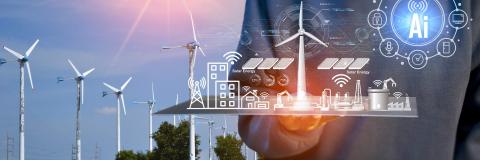
Highcast, AI for decarbonisation
Achieving production targets while cutting carbon emissions: a pipe dream for factories? Not for Highcast, a start-up offering AI-based software to optimise energy consumption for energy-intensive facilities across Europe.
Flore de Lasteyrie and Vivien Robert met while studying for their master's in Data Science & Business Analytics at CentraleSupélec. "We both worked for Artefact, a data management and analysis consultancy. After that, our paths diverged: she joined a start-up as its first employee and I was hired by a smaller company. However, over time, we realised that we wanted to create something of our own, something with a real impact to address the challenges related to transition," explains Vivien Robert, CEO of Highcast.
In 2021, the former colleagues reunited and founded Highcast in October of the same year. The start-up was incubated at 21st by CentraleSupélec. "We spent a lot of time speaking with industry professionals to understand their issues, conducting over a hundred interviews," adds the CEO. The start-up signed its first contract in 2022. Vivien Robert continues: "Recently, we've secured new customers and won the ‘Industry and Services’ category of Spring 50 at Paris-Saclay Spring 2024. This was real recognition of everything we've achieved with our industrial customers, and we're incredibly proud of it."
A solution for European industries
"The industrial sector is highly competitive, and professionals often don't have the support they need when it comes to the energy transition. They are particularly affected by the challenges it brings, especially the rising and volatile electricity prices," Vivien Robert points out. Indeed, electricity costs fluctuate depending on intermittent renewable energy production. For example, solar panels generate electricity during the day, particularly in summer, while nuclear power plants generate electricity almost continuously. "This increase in electricity prices could lead to the closure of factories in Europe, which would relocate to regions where energy is cheaper, but often more carbon-intensive and less sustainable than in Europe. Our aim is to create a solution to manage the challenges of the energy transition, so that factories remain in Europe," Vivien Robert explains.
Highcast's technology is designed to help manufacturers plan their production using software that uses artificial intelligence (AI). The most energy-intensive machines, such as those in metallurgy, paper making or cement production, are operated during times of the day when electricity is cheaper and less carbon-intensive. The start-up's solution is already up and running in a dozen factories in France, with customers including paper producer Norske Skog Golbey, concrete manufacturer Plattard and metallurgist Leroy Somer.
Despite promising growth, Highcast is still in its infancy and seeking to improve its solutions. "Currently, our AI software can predict electricity market issues up to ten days in advance. We're working to extend this visibility to one or even two months ahead, enabling manufacturers to adapt their production throughout the year." The software also offers a decision-support tool for production planning. "It provides a clear, tangible view of the production lines themselves. At Highcast, we believe that the energy transition presents opportunities, and that controlling electricity consumption is an underutilised performance lever. We are working to equip major manufacturers with the monitoring tools they need to reduce their electricity costs by up to 20%," Vivien Robert continues.
Interested manufacturers can subscribe to the start-up's solution and gain access to various forecasting software and updates. "Our technology delivers savings of between 5% and 20% on site. Highcast also aims to reduce manufacturers' carbon footprint by providing a tool to measure, monitor and optimise their actual carbon costs. Electricity prices are linked to CO2 emissions. When gas power plants are switched on, energy becomes more expensive and less decarbonised. Our software identifies when electricity is being generated by nuclear power plants and renewable installations and we encourage companies to consume during those periods. It's important for us to align economic and environmental issues," says Vivien Robert.
Decarbonising internationally
In the coming months, the start-up plans to raise its profile in France before expanding across Europe, to support companies that want to reduce their environmental impact. "We support large industrial groups that have operations in other European countries. We're starting with Europe, because it's at the forefront of reindustrialisation, but ultimately, we want to help factories in the United States and even China, where the challenges are enormous," explains the co-founder. Currently accelerated by 21st by CentraleSupélec, Highcast has eight full-time employees. The start-up plans to double its workforce next year. Recently, the company was awarded the Solar Impulse label, "designed to shed light on existing solutions that are both clean and profitable and have a positive impact on quality of life". It is also funded by the philanthropic accelerator, RAISE Sherpas. So far, the company has not filed any patents.
"From the outset, we wanted to develop a viable solution before raising funds. Now that we've proven that our technology works, we're announcing a €2 million funding round," says the CEO. This investment round is co-led by CentraleSupélec Venture, CentraleSupélec's alumni fund, and a private investor specialising in energy. It also includes AFI Ventures (Ventech's impact fund), VIF (the Wendel family shareholders), Super Capital and several business angels, such as Laurent Courtois, Vincent Bryant and François-Régis Déhéry. "This funding round will help us to fulfil the second part of Highcast's mission: to reduce manufacturers' carbon footprint by providing a tool to measure, monitor and optimise their actual carbon costs," concludes Flore de Lasteyrie, co-founder and Chief Technical Officer (CTO) of Highcast.
